‘The Flames Were Right in Front of Us’
Residents grapple with immense loss after wildfire’s abrupt growth on Flathead Lake’s east shore, where multiple homes burned to the ground over the weekend
By Tristan Scott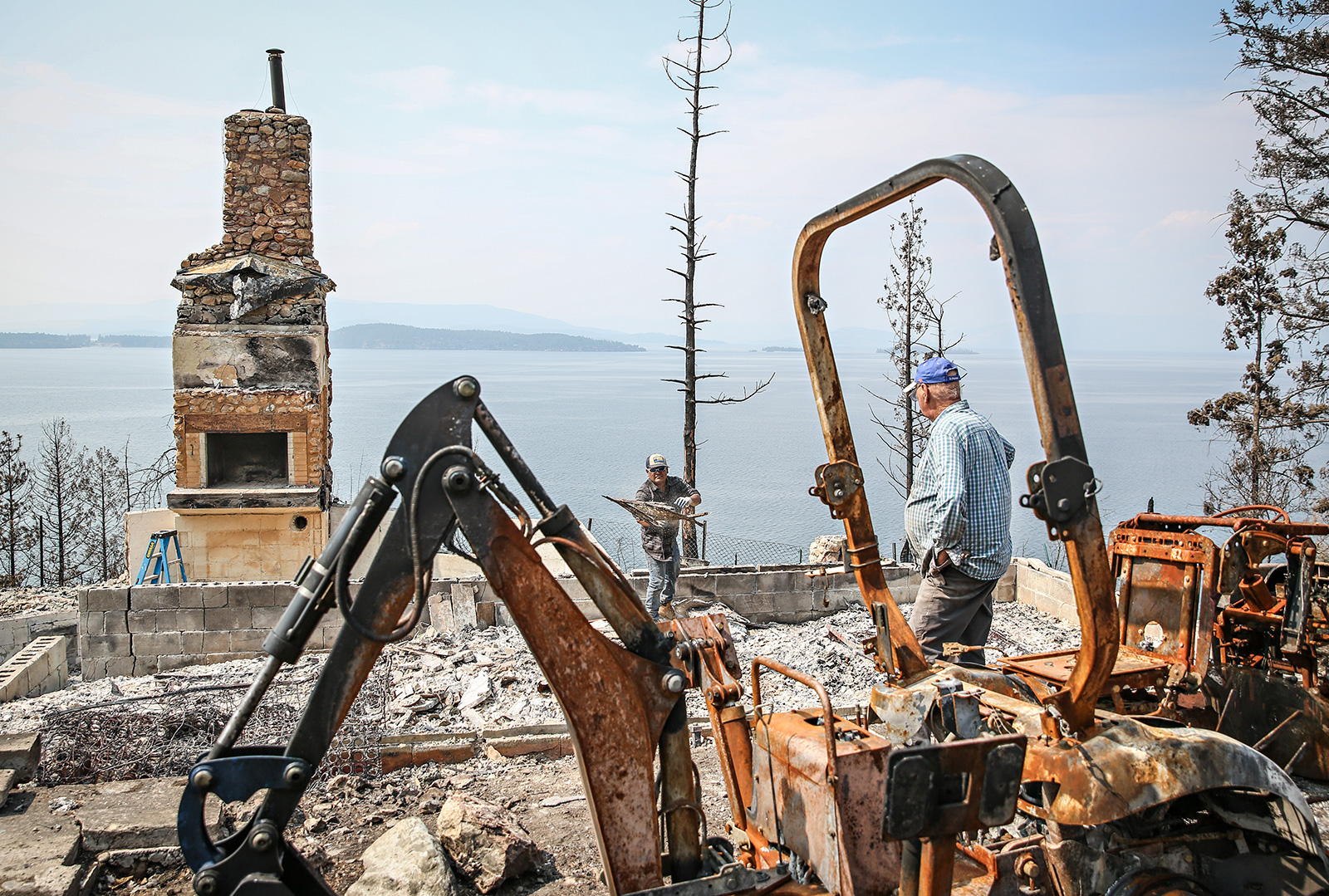
Even amid record-breaking temperatures and smoke-blurred horizons, summer nights on Flathead Lake are difficult to improve upon. The evening of July 31 was no exception for Kelly Kannberg and her family, until the hazy ridgeline above their east-shore home began sparking orange with wildfire and a leisurely Saturday night became a race against the clock.
It was a race she barely won.
“We could see the fire burning down the mountain toward us. We were spraying our roof with garden hoses and sprinklers, but the water was spinning above us, like there was a vortex,” Kannberg said, recalling the fire’s abrupt and violent growth, while estimating that she and her twin sons escaped within 10 minutes of her father’s prized log cabin catching ablaze. “We were there until the last minute. The fire jumped the highway and burned straight through the house.”
Kannberg and her family, which includes a 13-year-old golden retriever named Crewbie, are among dozens of residents who were displaced late Saturday night and early Sunday morning after the Boulder 2700 fire exploded in the Mission Mountains northeast of Finley Point, quadrupling in size as warm downdraft winds fanned the flames, scorching an estimated 1,200 acres and destroying at least 20 homes, according to officials.
By lunchtime on Sunday, many of the refugees were huddled in the shade of boulevard trees outside Linderman Elementary School in Polson, where volunteers from Red Cross Montana had patched together an evacuation center a full day earlier after the fire was first detected, prompting an initial evacuation order that was later lifted. The official decision to reverse the directive, made after fire activity had slowed, was a prominent topic of discussion among the evacuees as they struggled under the immense weight of their loss.
“After they lifted the first evacuation notice we went to dinner. Everyone was very chill. We were all happy,” Kannberg said. “Then we came home and before we knew it the flames were right in front of us.”
“We thought we were in the clear,” she continued. “Everybody thought they were in the clear. We called 911 for an hour-and-a-half trying to get help. But there was no help.”
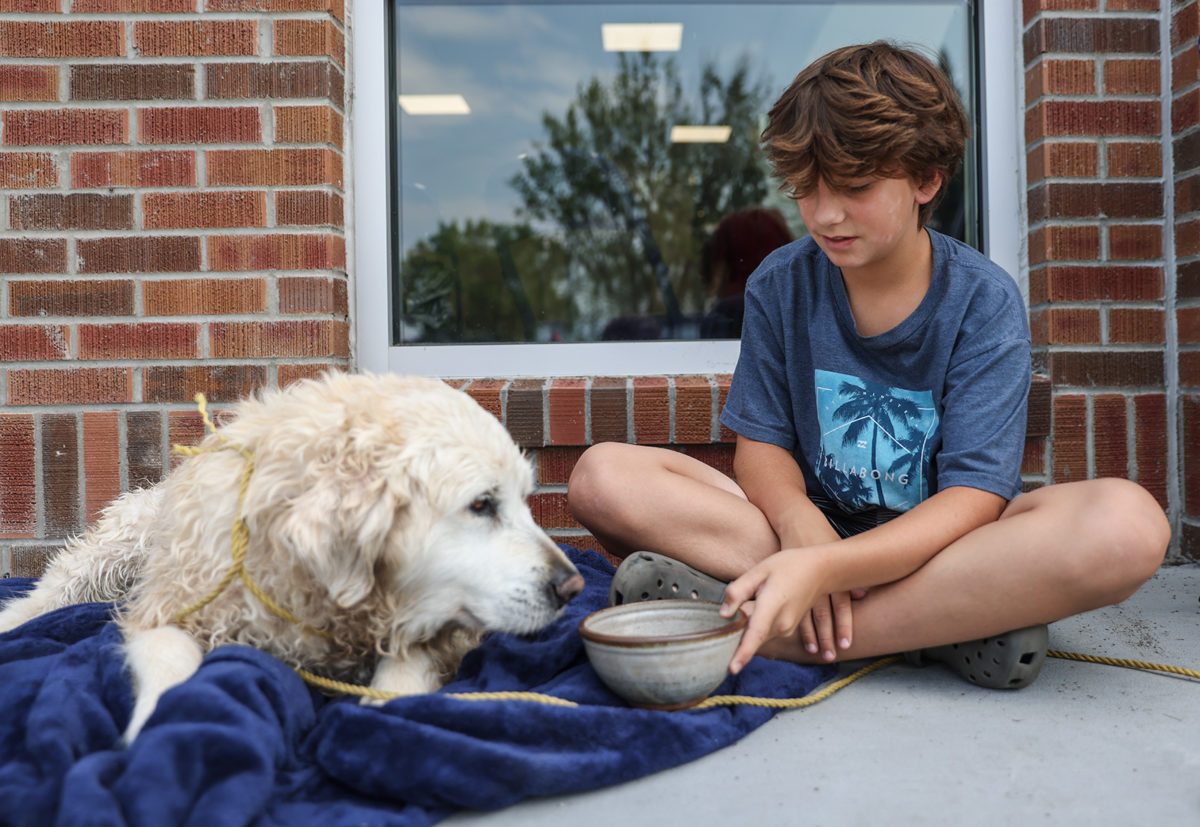
The Kannbergs came to the evacuation center around 2 a.m. Sunday after first spending hours awaiting updates outside the Finley Point Grill, south of the evacuation perimeter. A bewildered off-the-clock wait staff offered them bowls of huckleberry ice cream as a steady stream of evacuees arrived at the restaurant’s parking lot deep into the night.
“I think we were the first to evacuate, because after a while this line of cars and trucks started coming down the highway,” Kannberg said, adding that her neighbor’s homes between mile markers 9 and 10 were torched as well. “We were the first ones out and we were probably the first to burn.”
“I still don’t understand how this happened.”
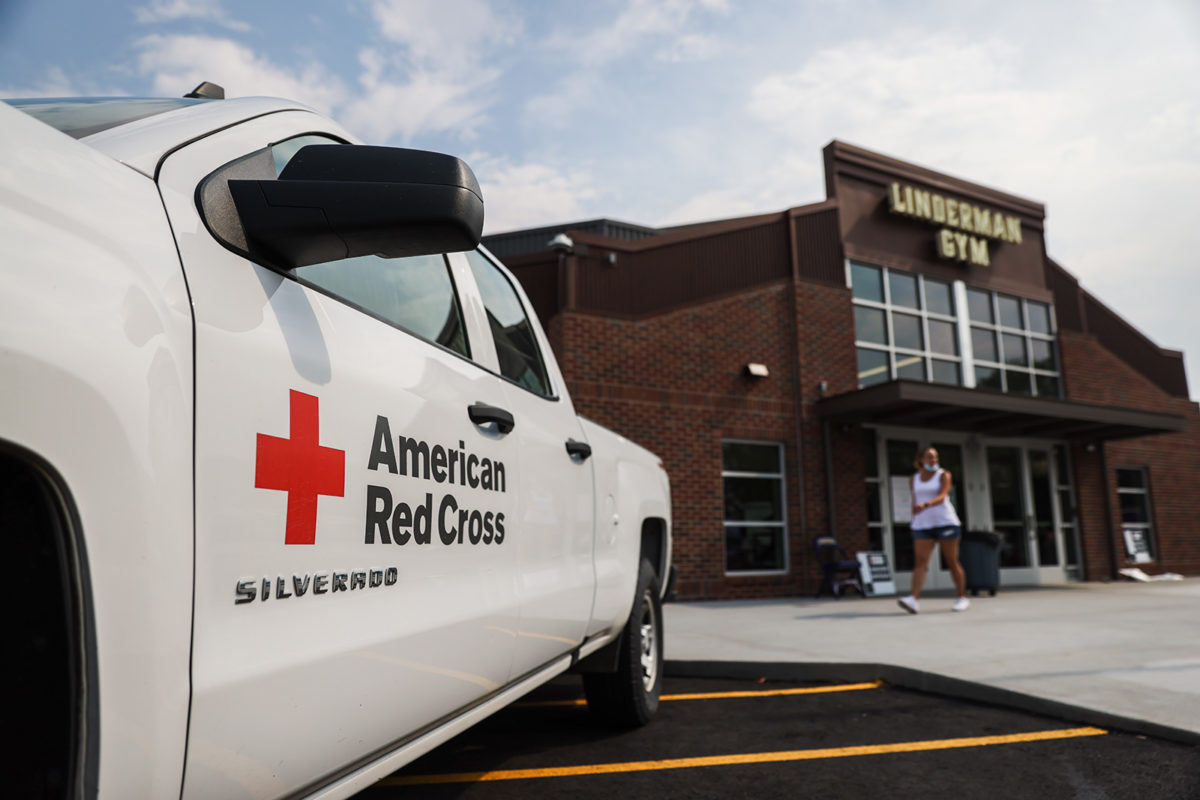
How it happened remains under investigation, though officials said initial indications point to a human-caused start. What they do know is the fire’s behavior became erratic Saturday night as high winds stoked the flames and pushed the fire toward Highway 35 and the lake’s eastern shore, which is lined with homes and cherry orchards. Meanwhile, the highway remains closed from mile marker 6 to Blue Bay and, as of Sunday afternoon, around 60 people had registered at the Red Cross evacuation center, many of them uncertain whether their homes were still standing.
Tipping a plastic bottle of water to his lips with one hand, Lake County Sheriff Don Bell used his other to hold the door open at the Linderman gym, where volunteers filed inside clutching armloads of donations and delivering towels, toiletries, blankets, and food to those in need.
Burning on the Flathead Indian Reservation, the Boulder 2700 wildfire is managed by the Confederated Salish and Kootenai Tribes’ (CSKT) Division of Fire, but Bell’s department helped dispatch the evacuation orders, while emergency resources from every jurisdiction within a 60-mile radius were on hand after the fire’s abrupt late-night growth. A Type 2 Incident Command Team, Northern Rockies Team 4, has been assigned to the fire and will be assuming command beginning on Aug. 2. A public information meeting is scheduled to be held at 6:30 p.m. at Linderman Elementary School. The school is located at 312 4th Ave E., Polson, 59860. This meeting will also be broadcasted over Zoom. For more information visit the incident management page here.
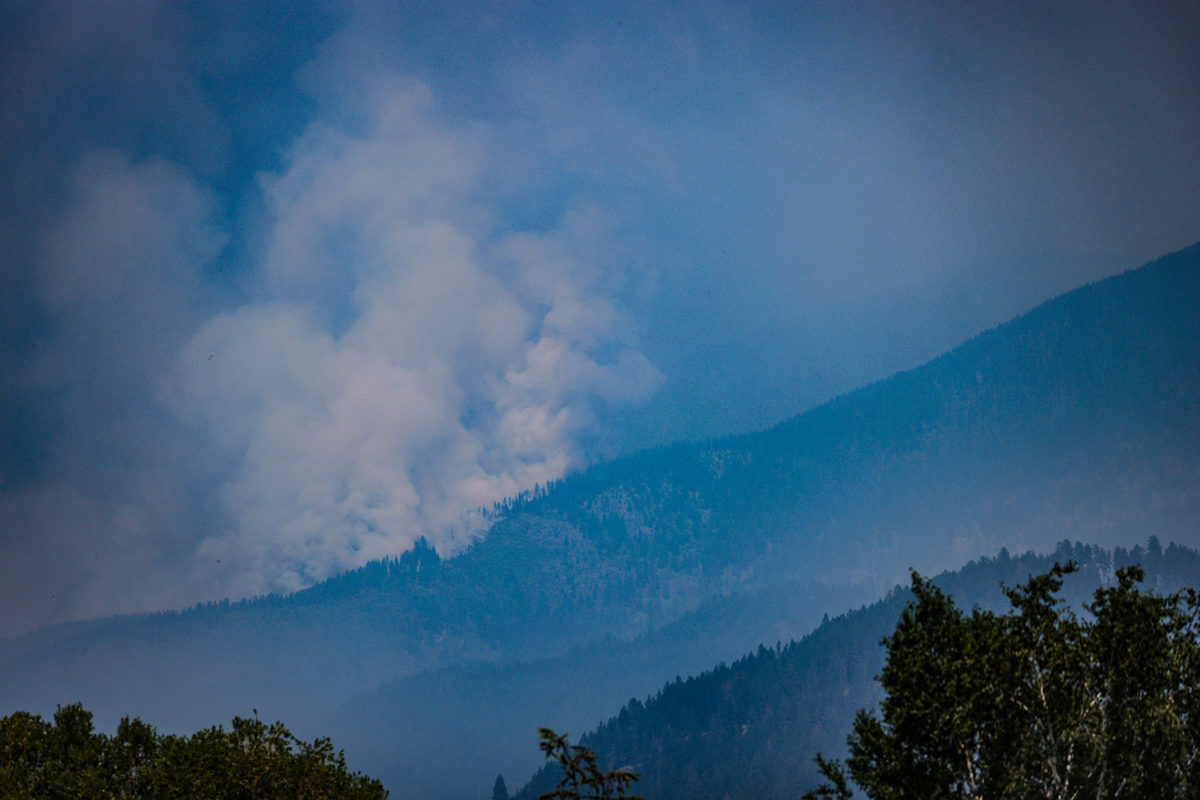
Bell estimated the temperature of the wind was 92 degrees at 11 p.m. on Saturday night when it began gusting out of the northeast, driving the fire west toward the shore of Flathead Lake, where it tore across Montana Highway 35 near mile marker 10 and doglegged south, burning up the lakeside homes in its path.
“That fire blew up. I mean this was like the stuff you see in movies,” Bell said of the blaze. “I’ve never seen fire behavior that volatile. Maybe someone else around here has, but I haven’t, and I’ve worked a lot of fires. It absolutely denuded everything in its path when it jumped the highway. I cleared out around 3 a.m. this morning and the only word to describe it is ‘menacing.’”
Whenever the skies cleared of smoke on Sunday, aerial resources, including two “Super Scooper” bombardier airplanes, buffeted the flames with water dipped from nearby Skidoo Bay, the proximity of which aided firefighters in their rapid response. An early-evening storm delivered less than a half-inch inch of rain on Sunday, but Monday’s wet and humid conditions are expected to be short lived. The thunderstorms Sunday night also stymied an aerial infrared reconnaissance flight of the fire’s perimeter, so the total acreage remains unknown.
“The turnaround speed on water drops is going to be a tremendous help,” Bell said, imploring boaters to stay out of Skidoo Bay. “Everyone is doing everything they can.”
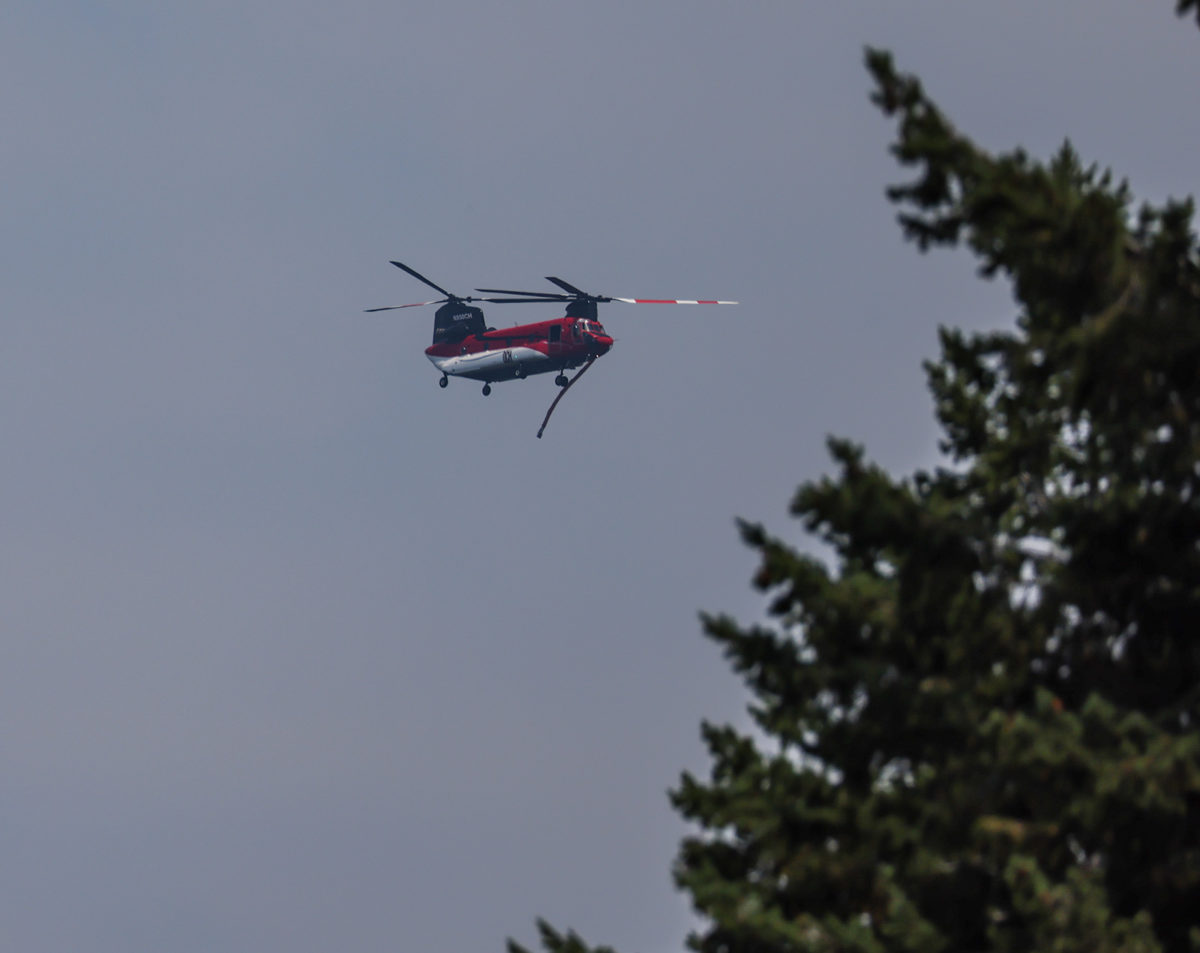
Indeed, everyone was doing so much on Sunday that John Peregoy, chair of the Lake County Red Cross Disaster Action Team, began urging community members to stop delivering supplies.
“After the first evacuation order on Saturday, we were here ready to serve people and the donations started trickling in,” Peregoy said. “Then the fire blew up and people haven’t stopped [delivering supplies] all day. It’s amazing. But we have more than we can use.”
Richard Bartasek, 86, and his Cavalier King Charles Spaniard, Ruby, were awakened early Sunday morning by fire officials evacuating the Paradise Pines RV resort 7 miles north of Polson. At the evacuation center, Bartasek learned that pets were not allowed.
“Ruby and I slept in my Jeep,” Bartasek said, having abandoned his new RV at Paradise Pines. “My wife died in December and I went out and bought an RV because I wanted to travel. I don’t know if it burned up or not, but Ruby and I are safe and this community is terrific.”
Eating a cheeseburger and pasta salad at the evacuation center, Bartasek said he and Ruby had arranged to stay at a temporary foster home Sunday night, thanks to the efforts of Polson-based nonprofit Life Savers Animal Rescue.
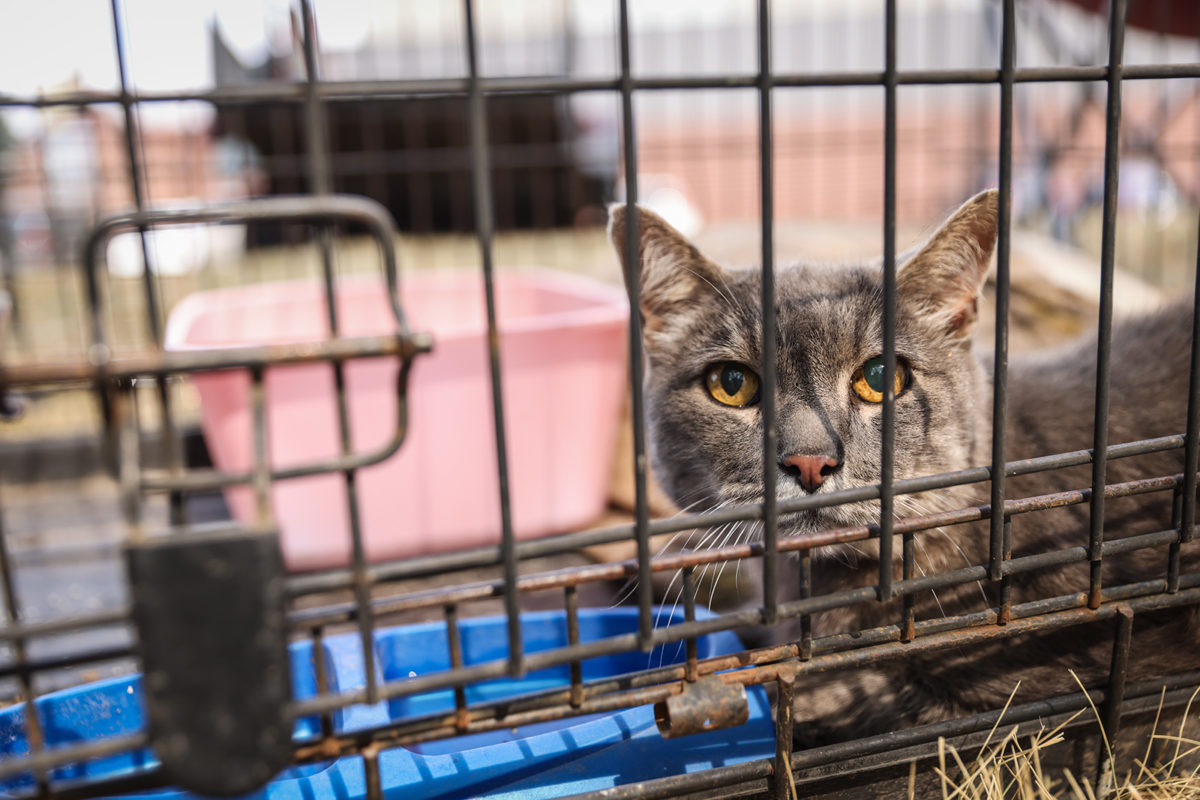
Lynette Duford, who runs the organization, said she’d found emergency shelters for as many as 30 dogs and cats, as well as space in pastures for livestock.
“Dogs, cats, horses, reptiles,” she said. “We literally have room for everything. We have donations of pet food donations, kennels. This town has rallied.”
Among the evacuees in search of temporary housing was Sebastien Cruz, of Yakima, Washington, who, along with both his parents, three siblings and their five children, has been living in his trailer at Blue Bay Campground. For the past two weeks, the Cruz family has been working Flathead Lake’s famed cherry harvest, a seasonal picking job that has helped support them for five consecutive seasons.
This year, their season ended early.
“Our work is done for the summer,” Cruz said.
In addition to the road closure and evacuation orders affecting a prominent strip of east-shore orchards, fire officials de-energized utilities along Highway 35 early Sunday, shutting down power from mile marker 6 to Yellow Bay, as well as on Finley Point. The precaution to prevent any further fire starts also meant a sustained lapse in refrigeration, and a portion of the cherries spoiled.
“There’s nowhere to store the cherries,” Cruz said. “There’s no more harvest.”
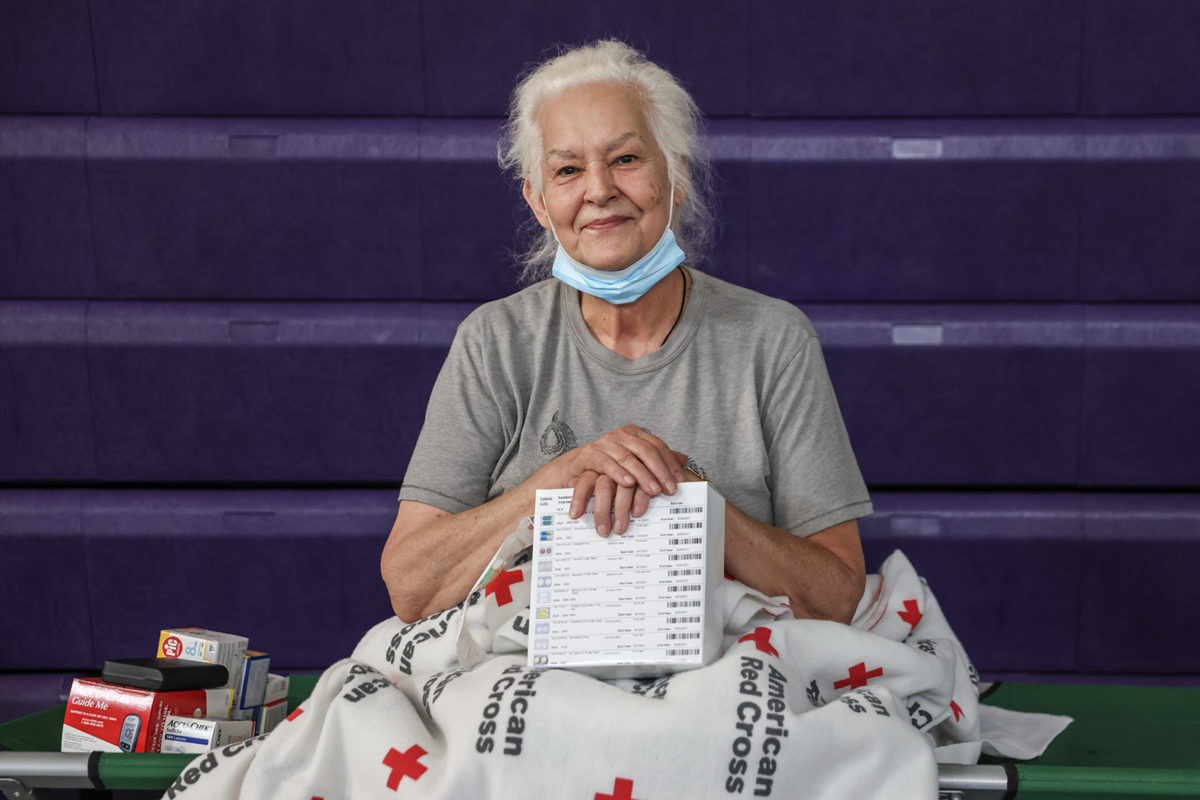
Sitting beside a wall outlet inside the gymnasium Sunday afternoon, Kannberg charged her phone and monitored a steady influx of text messages, occasionally exchanging details and information with the other evacuees. Scrolling through photos of the remains of the family’s home, Kannberg waited for an update from her father, who was en route from California. Although he typically spends his entire summer on Flathead Lake, where he bought his log home 20 years ago, he had recently returned to California to undergo cancer treatment. With the treatment behind him, he was eager to get back to life on the lake, where he’s recently finished building a new dock.
“He was so excited about that dock, about coming home,” Kannberg said. “Now everything is gone. There’s nothing left but the chimney.”
For more information about the fire status, evacuation services and support, or what you can do to help in the short term, follow the Polson Red Cross Facebook page at https://m.facebook.com/Polson-Wildfire-American-Red-Cross-704055910448872.